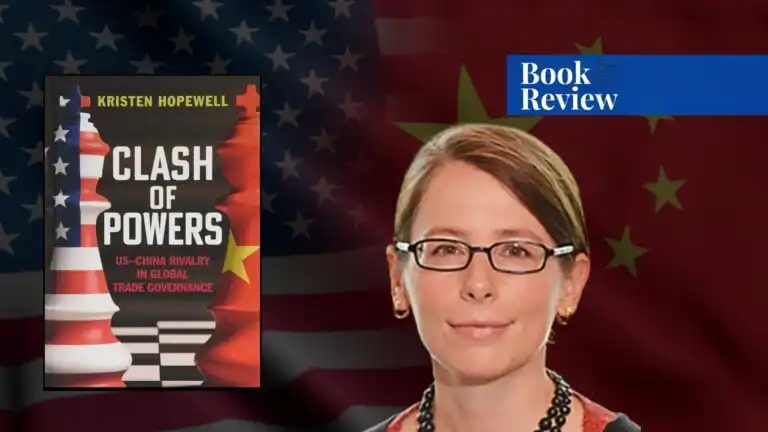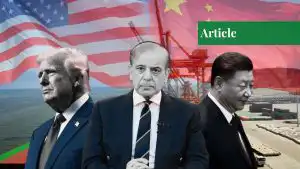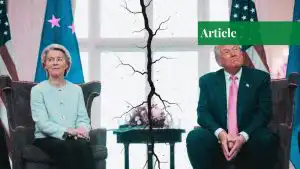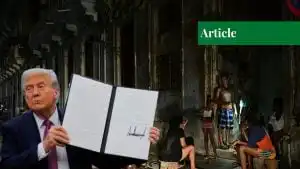Global trade governance is a framework of rules, institutions, and standards that regulate international trade, with the World Trade Organisation (WTO) playing a central role. In her book, “Clash of Powers: US-China Rivalry in Global Trade Governance, ” Kristen Hopewell explores the structure of trade governance, which was originally shaped by the influence of powerful Western economies and is now being challenged by China’s rapid economic growth. This book was published in 2020 by Cambridge University Press and sheds light on the complexities introduced by the “China paradox,” wherein China occupies the dual role of a developing nation and a major economic power within the international system.
Author Kristen Hopewell
Kristen Hopewell is an associate professor at the School of Public Policy and Global Affairs at the University of British Colombia. Her main research is around international trade, global governance, and development. Dr. Hopewell has completed her Phd. in Sociology from the University of Michigan along with a fellowship at Peking University and the Graduate Institute of International and Development Studies in Geneva. She has also worked as an investment banker at Morgan Stanley and a trade official for the Canadian government.
Around 2000, China had minimal involvement in global governance, playing a modest role in key industries. By 2008, it emerged as an influential player, actively shaping international norms, and by 2016, it held a leading position across most sectors discussed in the book. Hopewell explains that contrary to US expectations that China’s integration would yield mutual benefits, American influence in global institutions has significantly weakened with China’s rise. China now “controls the agenda, process, and pace of negotiations,” rejecting any terms countering its interests.
Unlike the Soviet Union, which was entirely outside the liberal order during the Cold War, China operates within the WTO yet remains a formidable competitor, more assertive and resistant to US influence than past challengers like Japan or Europe.
Hopewell’s work is the result of robust and comprehensive research. Her book was based on 200 interviews conducted between 2007 and 18 and archival documents from the World Trade Organisation (WTO) and the governments of Germany, New Zealand, Switzerland, the United Kingdom, and the United States. This extensive research provides a multi-layered foundation for her analyses. This approach allowed the author to examine the evolution of institutions and the impacts of economic shifts over time.
Introduction
In the introduction, the author introduces the core argument, which explores how the economic rise of China challenges US hegemony in global trade governance. The introduction also raises questions regarding the adaptability of WTO to altering power dynamics. She argues that long channeled through institutions like the WTO, American dominance is now significantly bulwarked by China’s rise as a major economic heavyweight.
The China Paradox
She introduces the “China paradox”—China’s unique position as both a developing nation and a global economic powerhouse—complicates its role in multilateral trade. Despite its vast economic power, China’s promotion of developing-country rights challenges the traditional North-South framework and creates tensions around principles like reciprocity and Special and Differential Treatment (SDT).
Chapter 1
The dual identity of the China–China paradox, as both a developing country and a major economic actor in global trade, is further elaborated by discussing five case studies. This paradox is evident in Chapter One on the Doha Round, where China’s claim to Special and Differential Treatment (SDT) rights has led to significant friction. The first chapter examines how China’s rise was profoundly disruptive to the multilateral trading system. Which further resulted in the breakdown of the Doha Round Conference.
However, a central and more debatable argument is that China’s strength and the relative weakness of the US ultimately led to the collapse of the Doha Round negotiations. This perspective might not convince all readers, as it appears to downplay the role of other emerging economies, such as Brazil and India, along with advanced European agricultural interests, in contributing to the impasse. Although the US played a major role in rejecting calls from emerging economies for a recalibration of trade rules, and its rivalry with China likely influenced the deadlock, the limited focus on Europe, India, and Brazil in this context could leave scholars of international trade questioning the scope of Hopewell’s analysis.
Chapter 2
In the second chapter, the author discusses how the US-China rivalry has paralyzed the ability of the WTO to formulate stricter regulations regarding agricultural subsidies. By portraying itself as a developing country, China argues to exempt itself from the cap on agricultural subsidies. This chapter shows how China’s rise as a major subsidizer has converted the traditional North-South conflict into a direct US-China confrontation. It details how the US, once a primary advocate of subsidy reform, now faces blockage from China, which uses its developing-nation status to justify extensive subsidies. This conflict has resulted in a stalled process of subsidy reduction, further complicating WTO negotiations.
Chapter 3
The third chapter discusses how, because of extensive subsidies, the accelerated growth of China’s industrial fishing fleet has contributed to overfishing and environmental issues globally. This section elaborates on China’s role as the world’s largest subsidizer in this sector. Hopewell illustrates how China’s demands for SDT exemptions from new WTO fisheries regulations challenge global environmental goals. China’s subsidized fleets make sustainable fishing practices increasingly difficult for other countries to enforce.
Chapter 4
While discussing export credit arrangements, Hopewell argues in chapter four that China’s massive export credits destabilize the existing trade disciplines while challenging Western economies. Shifting to the OECD, the author examines China’s impact on export credits, an area where China’s independent approach creates competitive tensions. She shows that China’s unregulated export credits, which largely fall outside OECD guidelines, give Chinese industries an edge in global markets, challenging traditional Western trade practices. China strategically used state-backed interventions, which opposes Western liberal principles of market-driven competition.
Chapter 5
Chapter five analyses the United States’ attempts to limit export credits for coal plants, exhibiting that China’s lack of participation in OECD discussions weakens the impact of environmental oversight within global trade agreements. China’s extensive financing, unaffected by OECD restrictions, undermines US-led efforts to reduce global coal dependency and meet environmental targets. Hopewell accentuates how China’s non-cooperation with OECD norms enables it to exert considerable influence on global trade while circumventing environmental obligations.
Conclusion
Finally, the author argues that this US-China rivalry has left the multilateral trading system in gridlock. Hopewell concludes by critically assessing the implications of U.S.-China competition for the future of international trade governance, raising questions about the capacity of institutions like the WTO to adapt effectively to China’s distinctive economic model. While China limits US influence in rule-making, it has not yet assumed a proactive role in creating new rules, leaving global governance precarious. Through her incisive analysis, Clash of Powers, Kristen Hopewell provides a critical perspective on the structural strains facing trade governance as it adapts to a world where China’s rise poses unresolved challenges to established power dynamics.
Analysis
Notably, the book avoids broad predictions about China surpassing the US, focusing instead on China’s measurable influence and the predictable responses of established powers. The book’s primary strength lies in Hopewell’s skill, illustrating how shifts in global trade rules mirror the waxing and waning of US dominance in the world economy. The current trade conflicts, underscored by the Trump administration’s 2017 move to impose tariffs on major partners, can be traced back to Washington’s inability to enforce its trade rules on Beijing since China’s 2001 WTO entry.
At times, the book’s use of interview material overlooks important context. For example, while China’s agricultural grants are indeed a concern for its trading partners, most of this support is consumed domestically, with China’s agricultural imports steadily increasing. Additionally, focusing on the size and opacity of China’s subsidies might benefit from more attention to advanced economies like Germany, France, and the Netherlands, which lead global agricultural exports. A more nuanced exploration of developed economies’ ongoing dominance in agricultural trade could enrich the discussion rather than suggesting that China merely manipulates the rules for its gain.
The “Clash of Powers” by Kristen Hopewell is a valuable addition to the literature on revisionism and challenges for global trade governance. It offers empirical insights into China’s challenge to the established order. Her analysis, particularly on China’s trade practices, highlights how its ambitions, supported by vast currency reserves and export subsidies, position China not to follow Japan’s path of the 1980s but potentially to shape future trade rules—a vital perspective for understanding evolving global power dynamics.
If you want to submit your articles and/or research papers, please check the Submissions page.
The views and opinions expressed in this article/paper are the author’s own and do not necessarily reflect the editorial position of Paradigm Shift
Danial Waheed is a final year student at King's College London studying BSc. Philosophy Politics and Economics






